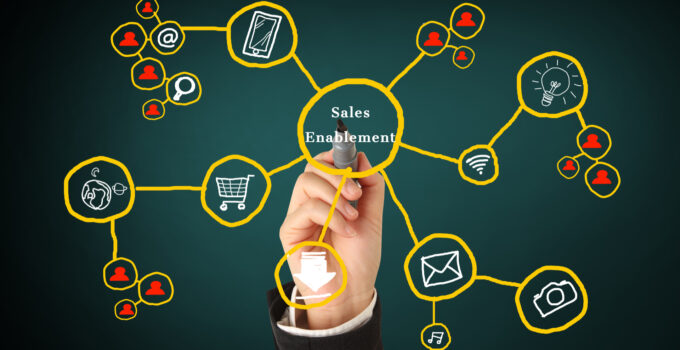Sales enablement is quite different from before, and it continues to evolve rapidly. In the past few years, it’s only been considered an option for businesses. Today, it has become a necessity for growth. This forced many companies to make desperate moves to change their sales strategies, focusing on virtual selling and enablement.
Together with sales enablement, the recruitment process, employee training, and employee feedback open the door to surprises and great possibilities. All departments become centralized, pursuing the same goal: increasing revenue and reaching its maximum potential.
If you want a stable sales enablement platform for your company, you may click here to learn more or contact your local sales and management specialists for professional help. However, if you’re curious to discover the power and impact of sales enablement in a company, then you’re on the right page.
Keep reading as you’ll learn essential information about sales enablement, including what it is, its importance, and many more.
What Is Sales Enablement

Source: touch-sell.com
Sales enablement is defined as a strategic and continuous process of providing the sales team with relevant and effective training, content, and guidance to engage effectively with customers. They use key analytics that provides them with data-driven intuition to streamline and improve their operation and fuel revenue.
A company that focuses on sales enablement allows its teams to be more productive by:
- Linking sellers to appropriate content.
- Producing smart ways to distribute content.
- Utilizing data to optimize the process.
- Providing sellers with adequate guidance and effective training.
- Evaluating everything presented above and comparing outcomes.
The Principles Of Sales Enablement

Source: husamjandal.com
The concept of sales enablement is designed based on the three principles: commitment, involvement, and engagement. The following lists their key differences:
-
Commitment To The Process
Creating a systematic process is essential to establish a cohesive organization, customization, and analysis of content. It requires the participation of multiple teams, defined expectations, and clear goals to reach sales enablement targets. Since it’s a continuous process, it should provide you with the flexibility to keep up with the constantly changing needs of consumers.
-
Involvement Within The Sales Team
Involvement within the sales team is crucial for success and development. Many companies invest time and money in sales enablement for this specific reason. Without it, everything may crumble and fall.
The continuous participation of the sales team can gradually improve customer engagement, resulting in sales enablement. Hence, it’s important to put the sales team on top of everything else to make the most of your investments.
-
Engagement Means Higher Revenue
One of the main goals of sales enablement is to improve sales performance by making customers engaged during the purchasing process. Most salespeople know how engagement is equal to opportunities. They should be proactive, accurate, precise, and data-driven when presenting to the target market to win their hearts.
Importance Of Sales Enablement
Because of the extreme level of competition in the market, the role of sales enablement becomes crucial in saving time and effort. They must do this while keeping in line with sales and content performance.
Furthermore, this heightened competition only means a robust sales enablement is not just great to have but also a necessity. Therefore, sales representatives need continuous access to content to ensure the engagement potential and existing customers.
With a powerful and effective sales enablement, salespeople will have access to the content they need throughout the process. Also, marketing staff will be able to produce more relevant content to help salespeople close the deal.
Benefits Of Sales Enablement

Source: campaignmonitor.com
Businesses may reap the great benefits of sales enablement as long as it’s properly done and well-executed. These benefits include:
-
Aligned Sales And Marketing
Sales and marketing are two different departments with different processes but the same goals. Although with the implementation of a strong sales enablement, you’ll notice that these two will collaborate better. Thus, increasing their productivity and improving their communications.
-
Consistent Teamwork And Employee Participation
Sales enablement uses tools and platforms that promote employee participation through sharing ideas, getting feedback, and effective collaboration. These essential factors allow them to develop and improve as they become more productive and efficient at work.
-
Shorter Sales Turnaround
With effective team effort and collaboration between different departments, sales representatives can offer their time to improve every customer’s purchasing period. Because of the ongoing relevant content and training, they can access the information they need when necessary. Doing so reduces the time spent, speeds up the process, and leads to a shorter sales cycle. A shorter cycle means higher chances of closing deals, and more closed deals equate to higher revenue.
Difference Between Sales Enablement And Sales Operations

Source: forbes.com
The main difference between the two is the focus of their goals. Sales operations concentrate primarily on how to generate sales, which includes reaching quotas, conducting geographic analysis, and more. On the other hand, sales enablement centers on improving and boosting customer engagement with the help of the sales team. They use the tools they need to present a product to the buyer and show them how your company will be able to help and improve their lives.
Moreover, sales operation where planning and organizing happen, while sales enablement utilizes everything planned. Furthermore, understanding that the main focus of sales enablement is ‘to sales’ instead of ‘for sales’ can strengthen the difference between the two.
Final Words
Sales enablement is what every company needs today to address the growing tension and heightened competition in the market. It mainly revolves around the key people in the process: the sales representatives.
A robust sales enablement helps salespeople promote and boost customer engagement by providing them with relevant content they can easily access anytime they need it. They can also use these tools to help the buyers throughout the purchasing process.
This leads to a shorter purchasing cycle, resulting in more closed deals and a higher revenue turnaround. That being said, it would be best to grab the opportunity and embrace sales enablement and start harvesting the benefits your company needs.







